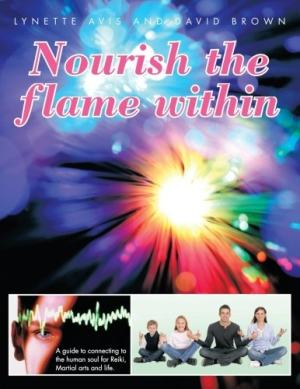Nourish the Flame Within
A Guide to Connecting to the Human Soul for Reiki, Martial Arts, and Life
Lynette Avis and David Brown share ways to harness life-force energy to enhance the practice of Reiki, the martial arts, and life itself in Nourish the Flame Within, bringing passion, sincerity, and a British version of down-home charm to the task. Avis is an artist, designer, and decorator whose long-term physical illness caused her to seek spiritual answers to her condition. Upon discovering her gifts as a medium, she studied spiritual and psychic development and Reiki healing and became a practitioner of Qi Kung and karate. Brown, who holds two science degrees, is a life coach and mentor with twenty-two years of martial-arts experience.
While the authors’ backgrounds would suggest a balanced and convincing presentation, the book is a mixed bag. Readers are rewarded with excellent spiritual exercises and meditations interspered with some lovely, even poetic, passages; unfortunately, however, all too often Avis and Brown entangle readers in long, rambling paragraphs that, while pleasantly conversational, tend to roam far afield.
The wide layout of the text makes it difficult to move from one line to the next and results in a bumpy reading experience, as do the frequent sentence fragments, errors in grammar and punctuation, and repetitive words and phrases. For example, the authors ask, “Is it tennis for you or hockey for you or football for you or swimming for you or martial arts for you or dancing for you?”
Unfortunate spelling errors make an occasional appearance (Deepak Chopra’s name is spelled “Deepack”), and many British terms and colloquialisms, left unexplained, create some rather startling images for American readers. Take, for example, the foods Avis recalls from her childhood: “toad in the hole,” “bubble and squeak,” and “spotted dick and custard.” Also left unexplained is the disease from which Avis suffers; she refers to it as “M.E.,” which stands for myalgic encephalomyelitis, also known as chronic fatigue syndrome.
The contributions of each coauthor are not clearly credited (“I” is used with no identification). Statements offered as fact should have been backed up with citations to lend greater credibility and encourage further exploration; the bibliography is minimal for the number, diverse nature, and complexity of the topics presented.
The book benefits from an eye-catching cover, but other illustrations are, for the most part, irrelevant. For example, a photograph of a clown accompanies a passage about mindfulness and acceptance; in another instance, a picture of a young girl whispering into the ear of a friend appears in conjunction with a discussion of the benefits of Reiki treatments.
Avis and Brown’s important message would have benefited from collaboration with editing and design professionals.
Reviewed by
Kristine Morris
Disclosure: This article is not an endorsement, but a review. The publisher of this book provided free copies of the book and paid a small fee to have their book reviewed by a professional reviewer. Foreword Reviews and Clarion Reviews make no guarantee that the publisher will receive a positive review. Foreword Magazine, Inc. is disclosing this in accordance with the Federal Trade Commission’s 16 CFR, Part 255.

